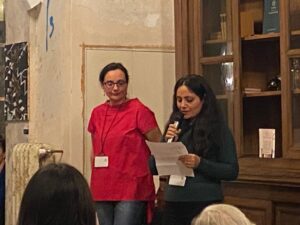November 2023 Meeting speaker recap
A Chilling Look at What it Means to be a Woman in Afghanistan Today
by Lisa Robbins

‘She was so different from me, a militant who lost both her parents to the Russian invasion of Afghanistan.’ Debora Picchi is referring to her co-presenter, Reha Nawin, an Afghani refugee, the first Afghan woman she met, in 1999. Reha has been engaged in documenting the Afghan war with the ultimate goal of bringing war criminals to trial passion and determination for justice and equality for the past two decades. The two met again in 2010 in Kabul and happen to be neighbours here in Italy, over a decade later.
Both are passionate human right activists who have collaborated in numerous projects over the past two decades. They shared the stage at the 8 November WIN meeting. Reha’s horrifying stories of abuse and injustice combined with Debora’s distressing facts left listeners shocked and pained.
Debora began working in refugee camps in Pakistan and in Kabul. She reinforced her knowledge of the dire conditions of asylum seekers through her affiliation with RAWA, an anti-fundamentalist, inter-ethnic organisation that champions democracy and women’s rights.
RAWA and similar organisations necessarily operate undercover: their work could easily jeopardise the lives of members and those they support. To stay safe Debora used to travel with fake papers, posing as a journalist. She visited schools and orphanages with a body guard: as a Westerner she is an easily identifiable target. Camouflage is necessary for this kind of work: Debora told of a little old lady courier who goes back and forth into enemy territory unharmed because who would suspect her?
Briefly, Afghanistan’s armed conflict began in September 2001 when the US-led international military coalition defeated the Taliban dictatorship. Twenty years later, the Taliban upended the Islamic state that had been established. The Afghan army folded. This was pre-arranged by both sides, because both stood to benefit, Debora said quietly. The takeover has led to significant infringement of human rights and rampant terrorism. The country is in chaos, dominated by insurgent groups, most all of which rule through a religious fundamentalist approach.
Afghanistan’s schooling system is collapsing
Today, only boys are allowed to go to school in Afghanistan. What the boys learn hardly goes by the name of education. From the age of 10 many are recruited into ‘religious’ schools which teach distorted perceptions and poisonous superstitions. Their families cannot afford to feed them. Instead, they are given food, clothing and shelter in Taliban schools. They are also indoctrinated into serving the state (regime), into joining the violent jihad against the country’s arch enemy: the evil USA. Learning to kill rather than to question seems the top item on the curriculum.
Subjects like English and Science have been eliminated. Many teachers and intellectuals have left the country, most of them in August 2021 when the crisis first began. Once the Taliban came, they scoured the houses to seize possible dissidents. Concepts such civil liberty, tolerance, equality for women and over all democracy and secularism are thrown by the wayside.
Girls are expected to stay home and look after the little ones. Females ‘are dangerous’, the Talban teaches. Debora told us that the regime wants to kill (cancel) all women. If a woman has a health problem she is not treated: ‘God will deal with it.’ There are only male doctors, of course.
The women spoke of the constitutional monarchy that ruled Afghanistan before the Soviet invasion, a situation similar to that of Iran before the Shah was deposed. There are big differences between these two countries, of course: Iranians have benefited from a higher level of education. Iran is a wealthier country than is Afghanistan.
‘How do the women cope?’ asked Debra. She told the story of a little girl aged 11, completely burned all over her body, who escaped from the tyranny of her violent husband. At age 40 today she has only seen war in her lifetime.
The audience had many questions:
What can we do to support RAWA? Most Western countries are actually supporting the Taliban because there is money to be made. A country rich in natural resources, (copper for instance), Afghanistan is the world’s major producer of opium drugs. Of course, there is rank exploitation. Most cropland is given over to the poppy while inhabitants die of starvation. Afghanistan is being exploited. Countless world governments have their finger in the pie: enlightened self-interest takes priority over the human right to live freely, afford healthcare, and receive justice when it is due.
What can we do to change our government’s current policy which does not seem to support human rights in Afghanistan? First of all RAWA is asking supporter to organize meetings like the present one to raise awareness on the situation of Afghanistan amongst the international community.
RAWA insists ‘that the Taliban should not have international recognition. Our governments should not negotiate with criminals.’ The current flow of support for Taliban should be interrupted. We can raise awareness.
What is the international response to this? What is the UN doing?
There is a huge humanitarian crisis in Afghanistan just now. No wages are paid, residents are dying of hunger, things are desperate. But how can the UN work in a country that is rife with corruption? Funds would go to a corrupt regime, where officials are interested in their own well-being. Worse, the focus of the news has long since shifted to newer topics. Today the Ukraine war corrals the headlines, politicians fly to visit, aid foundations send in money and food and supplies.
How can we help in general?
It’s difficult to keep in touch with RAWA. Everything is strictly controlled on the Internet.
CISDA (Coordinamento Italiano Sostegno Donne Afghane) is a conduit through which direct support can be offered. it is possible to financially support RAWA’s activities through CISDA.
Debora reminds us that the Taliban’s violent action comes from what they do. They are paid soldiers who prejudice and their skewed perspective in the religious school: Many have been raped or abused or near to starvation as children. It’s hard to remember that every fundamentalist has a mother.
Reha Nawin is a human rights activist and an Afghani refugee who has lived in Italy for the last couple of years. She has worked with Social Associations of Afghan justice seekers (SAAJS) for over twenty years.
Together with Debora Picchi, a teacher and activist, Reha has carried out numerous projects, including collecting documentation of the war in Afghanistan over four decades.
The ultimate goal of this project is to bring war criminals to court. Both have collaborated with COSPE (https://www.cospe.org/) and its projects in Afghanistan, focusing mainly on the Takhar province, Kabul and refugee camps in Islamabad and Peshawar (Pakistan). Register now and spread the word. This is a rare opportunity to gain true insight into what being a woman in Afghanistan in today’s world entails and how it impacts all women on a global level. It also calls attention to the serious work that still needs to be done in the fight for equality and justice.

